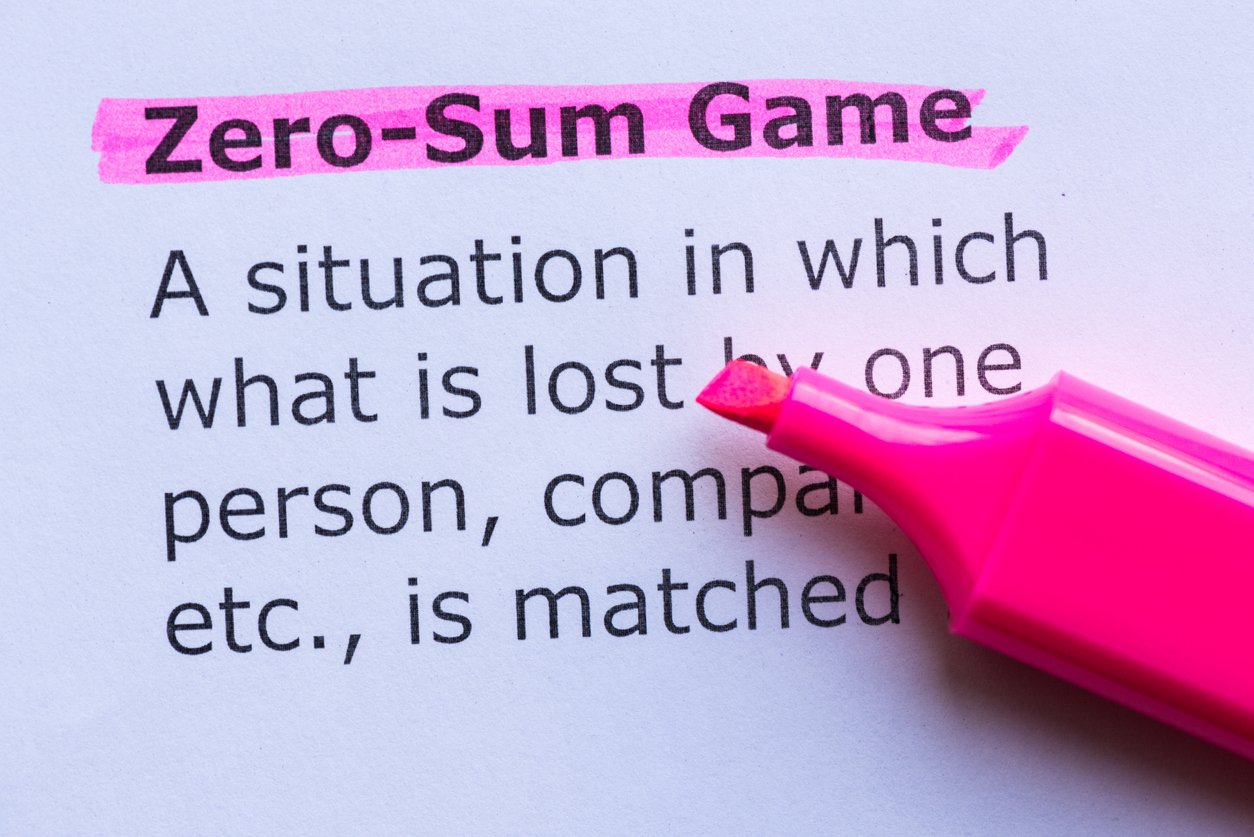
When gathering information, ask more open questions (who, whose, what, when, which, why, and how). They will be perceived as less threating and more collaborative while getting you more helpful information.

By Thomas Wood
All good negotiators know that their opening offer should be
Yet, more often than not, we don’t open high enough (or low enough depending on your perspective). Knowing why this happens helps us avoid making this mistake.
A group we worked with recently identified five factors at play:
All of these factors are common mistakes. Remembering that a negotiation is a dialogue with an outcome in mind is the first step. Racing to the end eliminates the potential for either side to develop mutually beneficial solutions. Test assumptions with your counterpart, and not in your own head. And stick to your plan until you learn information that justifies a new strategy.

By Thomas Wood
Are you “on the fence” about your neighbors? I train seasoned business professionals to negotiate in a wide range of industries and professions, and it never fails that I get asked to help with someone’s latest negotiation problem -- not with a key customer or difficult supplier -- but with a neighbor. Everyone has a story to tell! Learn from the mistakes even I succumbed to in neighbor negotiations.
You don’t get to choose your neighbors, and you don’t have to like your neighbors. But unless you are a billionaire like Mark Zuckerberg and can purchase your neighbors' properties in order to protect your own privacy and view, you will have to deal with your neighbors. Here's my tale of hard lessons learned.
My wife and I bought a house next door to a sophisticated widow of considerable wealth - we called her "Lady H." Lady H had previously owned our adjoining lot, with her house being grand and ours being, well, quaint - a more modest guest-house. Lady H lived alone in her old age and wealth, and barely recognized the existence of my family despite our attempts to win her over with fresh picked blue berries and smiles across the lawn.
Years earlier when Lady H owned both parcels, she had a fence placed near our joint property lines but located squarely on my parcel – a chain link fence that was now in disrepair and unsightly. My wife and I were ready to upgrade our property, and assumed that Lady H would appreciate the investment, as it would add to the value of her property as well. We decided to tackle the thing most unbefitting to our properties – the rusted chain link fence on our parcel.
As an expert negotiator who coaches others, I knew exactly what to do – prepare my options and strategies before negotiating a deal with Lady H. We did our research and formed our strategy, and then dropped by to see Lady H. I told her we were taking the old chain link fence down, and handed her a brochure that showed fences with the same open air view as her chain link fence, but added sophistication befitting her estate. While my wife and I were ok with all the options, I didn’t share that with her, as I wanted to see what Lady H wanted first. I had planned to then reluctantly accept her fence preference in exchange for several other things we wanted, like for her to have a dead tree on her property taken down that posed a threat to our safety.
I was ready to discuss options and begin some give and take, but she cut the conversation short. Pointing to the most expensive option, a decorative iron fence, Lady H nicely said, “I like this one. Do what you need to do,” and thanked me for coming by. I was surprised, but pleased at least with the efficiency of our “negotiation."
When our new and very expensive iron fence was installed, I was thrilled. We could see each other’s lovely gardens but without having to look through the eye sore of that rusted chain link fence. My satisfaction was short lived.
A week later, Lady H installed a taller, builder-grade, wood privacy fence on her property, abutting and completely overshadowing the new iron fence. What had I done wrong? Everything, pretty much!
First, know your neighbor's true interests.
I didn't bother to learn Lady H's interests - why she wants what she wants. It turned out that Lady H regretted having sold the adjoining property because she now had a young noisy family that liked to spend time laughing and playing outside - ours. Lady H had grown older since the days when she had installed that chain link fence, and her interests had changed; she now wanted quiet and privacy.
Second, understand who you are dealing with. 
Lady H could have simply proposed a privacy fence, and not had to spend her own money to get the privacy she wanted. Why didn’t she? Easy to see why in retrospect:
Third, to negotiate a solution requires collaboration.
I did not trade value to reach a mutually beneficial solution, which is how you capture value in collaborative negotiations. When the other party says “Yes” right away, you can be sure that either you did a great job of convincing them, or like in my situation, you are being outmaneuvered. Maybe you unwittingly offered them more than they ever thought they could get, so they jump at your offer, or maybe like Lady H, they have a strong plan B that they are ready and willing to implement. A quick and easy win in negotiations usually turns out not to be a win at all.
With neighbors and in business, knowing the other party's ego needs, interests and BATNAs, engaging in a collaborative conversation to solve your interests and theirs by trading for value – determines whether you actually get what you want. Robert Frost's famous line - Good Fences Make Good Neighbors -- perhaps should have been Good Negotiators Make Good Neighbors.

By Leslie Mulligan
All of us want to see professional sports up and running again, and MLB could be the first post-Covid-lockdown. But only if the Major League Baseball (MLB) with its powerful, moneyed owners and the Major League Baseball Players Association (MLBPA), a seemingly united players union, can bridge their financial divide on players’ salaries. But deadlines force concessions: if Opening Day does not come by early July, there is no hope for a season this year. Which means we MUST be in the final stages of a 2020 baseball negotiation!
On March 16, the baseball season was formally postponed by MLB due to Covid-19, till at least mid-May, but with hopes of still playing a full schedule, as documented in this CBS Sports timeline.
Both sides were eager to plot a path forward and so convened at the negotiation table on March 26 to define what opening up again would look like. At that moment, the owners and the players were willing to tackle the health and safety challenges ahead, and also agreed to pro-rated player salaries on whatever might remain of the season. After all, no one wanted a repeat of the 1994-1995 season where the US national pastime stopped abruptly on August 11, when Collective Bargaining Agreement talks broke down. Public sentiment for baseball took a hit that year with no World Series; both sides want to avoid reliving that history as a result of Covid-19.
Owners and players were “on the same page” on March 26, trusting each other to forge ahead together. Normally, major leaguers trust MLB owners to ensure their livelihoods with generous salaries, but with Covid-19 looming, players now were trusting MLB with their lives as well. Trust is crucial to any successful business partnership, but most certainly to the negotiations that serve as the foundation of an alliance.
Since late March, MLB and the players union seem to be successfully negotiating health and safety issues for the athletes as they take the field again, both in spring training as well as on the field, although some open issues remain. But one financial element became a significant obstacle -- player compensation. MLB expected that when the season started, they could play in front of their fans, and their initial proposal was based in part on the expectation of stadium revenue.
Without fans, the owners realized they could lose more than $640,000 per game, with no gate receipts or merchandise/food & beverage sales. That March 26 agreement was swept off the table with this new premise, as it was clear that  baseball stadiums would not soon be filled with cheering fans. It’s not unusual that mid-negotiation, assumptions about the future change -- raw material prices rise, mergers occur, markets collapse, and in this case, a pandemic shuts down the gathering of fans – the crucial element to profit. Both sides went back to their camps to reconsider. The players expected to ensure that their salaries remained “whole,” but were willing to pro-rate their overall income, depending on the number of games played. And of course they want a longer season as a result. The owners insisted that with their revenue cut due to empty ball fields, they expect the players to share that loss by only earning some percentage of their pro-rated salary – the % to be negotiated.
baseball stadiums would not soon be filled with cheering fans. It’s not unusual that mid-negotiation, assumptions about the future change -- raw material prices rise, mergers occur, markets collapse, and in this case, a pandemic shuts down the gathering of fans – the crucial element to profit. Both sides went back to their camps to reconsider. The players expected to ensure that their salaries remained “whole,” but were willing to pro-rate their overall income, depending on the number of games played. And of course they want a longer season as a result. The owners insisted that with their revenue cut due to empty ball fields, they expect the players to share that loss by only earning some percentage of their pro-rated salary – the % to be negotiated.
The next MLB Proposal came in early May: “MLB and the owners will seek additional pay reductions from the MLBPA to account for the revenue lost by not having fans in the stands. MLB will propose a 50/50 revenue split in 2020.” The players were NOT having it – a 50% cut when they had anticipated 100% of their per game salary. Any trust that existed in late March eroded quickly – as Jeff Passan of ESPN wrote on May 26: “Trust, on the other hand, is hard to come by, and if this thing falls apart -- if the absence of a good-faith negotiation dooms the 2020 baseball season -- it won't be directly because of the coronavirus pandemic. It will be because of the erosion of trust in recent years among the leaders on both sides poisoned and polluted the landscape to an extent that a deal never was going to happen in the first place.”
The MLBPA challenged the owners to produce the data showing the financial losses that the owners claimed. In any negotiation, each side more easily comes to an agreement when they feel the offers are fair. Challenging data is often key to one side accepting an offer. Already the players felt disadvantaged, stressing that the health risk falls predominantly on the players taking the field, so the data needed to be reviewed and assessed to show more games produce greater losses.
But neither players nor owners want to be painted as the villains in this play, so discussions have continued, with the clock ticking loudly.
A number of proposals have gone back and forth since that first MLB offer; fortunately, the health and safety challenges are being collectively and successfully tackled by both parties. However, financial hurdles persist. Neil Paine of FiveThirtyEight.com provides a deep dive into the MLB financials yet concludes “it still seems like all parties involved have too much to lose not to come to a compromise.” Some creative solutions have been introduced, with the potential deferral of salaries in the event the post-season is canceled, but owners pushed back on that. Even wealthy team owners are nervous about an uncertain future, and some have voiced concerns about already being maxed out on credit lines.

So for a 2020 season, what alternatives does either side really have, if any? In the lexicon of negotiation, what are their Best Alternatives to a Negotiated Agreement (BATNAs)? MLB and the owners believe they can unilaterally implement a shorter schedule season, but they risk the wrath of the players if they do. How the players react to that will be telling. Will they walk away and forego all 2020 salaries, citing health risks? Or will they file grievances that would take months to work through in arbitration and still may not conclude satisfactorily for either party? BATNA’s are never ideal!
So where does that leave the baseball fan now? The reality is that in negotiations deadlines force concessions! And MLB wants to get a 3-week spring training underway as soon as possible so that they can target a July 4th Opening Day. Why is that? Oddly enough, it is with the end in mind! The Washington Post’s Dave Sheinin writes “MLB believes it needs to complete its postseason, its primary driver of industry revenue, by the end of October to guard against a potential second wave of the coronavirus.”
As of June 8, the latest MLB proposal was for a 76-game season, with 75% of pro-rated salaries, but not all of it guaranteed. Only 50% assured, based on the regular season; if the post-season is canceled, the remaining 25% disappears. Once again, the players have pushed back. But the MLBPA response is due June 10, ironically the day they had hoped spring training might begin. Who has more to lose? Owners or players? I think it’s the stakeholders – baseball fans. Let’s see if some trust can be regained in these final weeks, as July 4th is not that far off – that looming deadline should push both parties back to the negotiation table in earnest. Let’s hope we all hear “batter up” soon!

By Leslie Mulligan
As the war in Ukraine expands and intensifies, we watch the sickening devastation and ask how can this be happening – has Vladimir Putin gone mad? The horror inflicted on innocent Ukrainians is so shocking, one might conclude that Putin has gone over the edge and lost touch with reality. Rational people wonder: why is he doing this, and can he be reasoned with to negotiate a diplomatic resolution to this nightmare?
Putin’s current position is clear – he presented the US and NATO his list of security demands in December 2021, including a guarantee that Ukraine never enters NATO and that NATO rolls back its military footprint in Eastern and Central Europe. At that time, his BATNA (best alternative to a negotiated agreement) was apparent - invading Ukraine (he has never truly ascribed to Ukraine’s sovereignty.) Negotiations had barely begun in January when Putin executed his BATNA. Ukraine and Russia were at war. And shortly after the invasion, Putin ratcheted up the rhetoric, threatening an even more terrifying BATNA – use of nuclear weaponry. The stakes are higher than ever for the West now, as Ukraine bears the brunt of this savagery.
his BATNA (best alternative to a negotiated agreement) was apparent - invading Ukraine (he has never truly ascribed to Ukraine’s sovereignty.) Negotiations had barely begun in January when Putin executed his BATNA. Ukraine and Russia were at war. And shortly after the invasion, Putin ratcheted up the rhetoric, threatening an even more terrifying BATNA – use of nuclear weaponry. The stakes are higher than ever for the West now, as Ukraine bears the brunt of this savagery.
Is Putin rational and should we negotiate with him at all?
Experts within the intelligence and national security community warn against viewing Putin as a madman. In early March, a veteran former CIA operative said of Putin, “He may have made a miscalculation, and many of his beliefs are wrong, but he is rational, consistent, and ruthless.” That ruthlessness is on full display as innocent Ukrainians suffer his brutality, resulting in a massive humanitarian crisis with more than 3 million refugees fleeing their country.
We know Putin’s position, but what are his interests – his underlying motivations. Skillful negotiators realize there is often more than one way to solve a party’s real concerns – why they want what it is they’re asking for – not just the position they put on the table. In negotiations, those concerns are called “Interests” and must be addressed for a sustainable resolution. In collaborative negotiations, parties address both sides’ Interests to create more value overall. Clearly, the situation in Ukraine does not invite collaboration – and yet we must still come to the table and craft a negotiation strategy that resolves this nightmare. Compromise, a less ideal strategy than collaboration, may not feel good but must be explored.
What are Putin’s Interests?
 If we focus just on President Putin, what are the Interests in play, underpinning his position? From his remarks on the world stage, Putin is clearly motivated by the paramount "goal of regaining the importance in the world the Soviet Union used to hold - and restoring Russian pride." Putin came of age as a young KGB operative during the Soviet era, when the USSR was the counterweight to the power of the West, namely the US. That is how he defines greatness - regaining the power of the former Soviet Union.
If we focus just on President Putin, what are the Interests in play, underpinning his position? From his remarks on the world stage, Putin is clearly motivated by the paramount "goal of regaining the importance in the world the Soviet Union used to hold - and restoring Russian pride." Putin came of age as a young KGB operative during the Soviet era, when the USSR was the counterweight to the power of the West, namely the US. That is how he defines greatness - regaining the power of the former Soviet Union.
After the Berlin Wall fell and the USSR dissolved, Putin mourned “the national humiliation of a powerful state simply imploding”, notably not the “human cost or material tribulations ”. To Putin, the decades since the collapse of the USSR have not been kind to Russia. Fiona Hill (a NSC advisor to President Trump and former National Intelligence officer on Russia to Presidents Bush and Obama) gave an interview to the New York Times earlier in March, noting that Putin has "this mentality that Russia is always under siege, its leaders are always under siege."
Upon becoming the President of Russia in 2000, Putin was the embodiment of that greatness and the link between modern times and the Russian czars and czarinas that first achieved Russian prominence and pride. Putin’s real Interests then appear to be safeguarding his legacy as the restorer of Russia to its glory - reconstitution of the grandeur of the Soviet Union. Carlos Lozada wrote eloquently recently in the Washington Post: “Russia’s glory is his goal, but Putin’s own power is always the convenient means.”
If this crystallizes Putin’s Interests, can they be effectively addressed via negotiations or are other means necessary (and already in play)? Notably, addressing Interests works when dealing with most rational negotiators. But is Putin rational or irrational?
Putin rational or irrational?
Irrational negotiators act against their own Interests
Irrational negotiators appear to act against their own interests in the face of good information. Is Putin acting against his own Interests? Reflecting on the siege mentality Fiona Hill noted, is it real or imagined, or a major miscalculation on Putin’s part? Peter Baker at The New York Times reported back in March of 2014 that German Chancellor Angela Merkel shared her insights on Putin with President Obama, “that after speaking with Mr. Putin she was not sure he was in touch with reality, people briefed on the call said. 'In another world,’ she said."
Both rational and irrational negotiators fall prey to miscalculations.
So, is Putin miscalculating because he is misinformed? Stephen Kotkin, the renowned scholar of Russian history and Fellow at the Hoover Institution, was interviewed recently by David Remnick for The New Yorker and stated that Putin “is not getting the full gamut of information. He’s getting what he wants to hear. In any case, he believes that he’s superior and smarter.” This is a potentially catastrophic problem with despots as evidenced by current events.
Putin addressed the Kremlin on the eve of the Ukrainian invasion with the rationale for what would soon befall Ukraine. One foreign policy analyst described it as a "resentful diatribe" that highlights his view of the deceit of the West in its approach to Russia. But the analyst underscores that “Putin was not being irrational.” In fact, it showcases how his “worldview is taking him into conflict”.
Kotnick continues, “war usually is a miscalculation. It’s based on assumptions that don’t pan out, things you believe to be true or want to be true.” That is playing out in real-time in Ukraine. Putin over-estimated his own military capability, assuming Kyiv would fall swiftly - a few days and a puppet regime could be installed. And he wildly under-estimated the fierceness and strength of the  Ukrainian resistance. And then there is the unity of the western democratic powers – President Zelensky inspires the West with his steely leadership. In Zelensky’s address to the U.S. Congress, he evoked the US’ history in Pearl Harbor and 9-11 to urge its increased involvement. Western powers have come together to inflict economic war on Russia, but also to buttress the Ukrainian forces with weapons and support – whether significantly more support is forthcoming remains to be seen, as the West has thus far rebuffed the idea of a no-fly zone over Ukraine. Regardless of Western maneuvering, Putin is discovering the danger of unverified assumptions; he has had to reach out to China to overcome Russia’s military preparedness issue - in hopes that China will provide material support. It is imperative to be crystal clear on what is known/unknown, and what is assumed, as you prepare for negotiations, let alone warfare.
Ukrainian resistance. And then there is the unity of the western democratic powers – President Zelensky inspires the West with his steely leadership. In Zelensky’s address to the U.S. Congress, he evoked the US’ history in Pearl Harbor and 9-11 to urge its increased involvement. Western powers have come together to inflict economic war on Russia, but also to buttress the Ukrainian forces with weapons and support – whether significantly more support is forthcoming remains to be seen, as the West has thus far rebuffed the idea of a no-fly zone over Ukraine. Regardless of Western maneuvering, Putin is discovering the danger of unverified assumptions; he has had to reach out to China to overcome Russia’s military preparedness issue - in hopes that China will provide material support. It is imperative to be crystal clear on what is known/unknown, and what is assumed, as you prepare for negotiations, let alone warfare.
Putin’s penchant - Zero Sum game negotiating
 The Insider described Putin’s view of negotiating with international partners: he sees “foreign policy as a zero-sum game — a gain for one side comes at the expense of its opponent”. The West perceives itself as more typically pursuing strategic, collaborative negotiations, where mutually beneficial gains can be achieved. Yet we must still negotiate with President Putin despite the opposing approaches. As the CIA operative noted, “he is behaving rationally within the confines of a fundamentally irrational set of beliefs.” At his core, he is acting true to his personal Interests and what he believes to be Russia’s over-arching Interests. In this situation, we should treat Putin as a rational negotiator and work to prove his assumptions wrong before he will come to the table with any true intent to negotiate in good faith.
The Insider described Putin’s view of negotiating with international partners: he sees “foreign policy as a zero-sum game — a gain for one side comes at the expense of its opponent”. The West perceives itself as more typically pursuing strategic, collaborative negotiations, where mutually beneficial gains can be achieved. Yet we must still negotiate with President Putin despite the opposing approaches. As the CIA operative noted, “he is behaving rationally within the confines of a fundamentally irrational set of beliefs.” At his core, he is acting true to his personal Interests and what he believes to be Russia’s over-arching Interests. In this situation, we should treat Putin as a rational negotiator and work to prove his assumptions wrong before he will come to the table with any true intent to negotiate in good faith.
Must we provide a bridge or an off-ramp to Putin?
What can seasoned diplomats do next in this tragic situation? Do we have to provide Putin a way to “save face”?
World leaders are wielding myriad tools of influence as they try to resolve this situation swiftly and peacefully. Power is on full display by Russia, the West is implementing crippling  sanctions as a financial lever, Ukraine is certainly trying to persuade the West to enter the fray more boldly, and negotiations are ongoing - both between Ukraine and Russia but also between President Zelensky and NATO countries. Other stakeholders are exerting influence too - as China and myriad global oil producers factor in, directly and indirectly. US President Biden and Chinese President Xi Jinping held an hour-long telephone call to get clear on the implications of China wading into this situation - China’s influence will certainly impact what happens next in Ukraine.
sanctions as a financial lever, Ukraine is certainly trying to persuade the West to enter the fray more boldly, and negotiations are ongoing - both between Ukraine and Russia but also between President Zelensky and NATO countries. Other stakeholders are exerting influence too - as China and myriad global oil producers factor in, directly and indirectly. US President Biden and Chinese President Xi Jinping held an hour-long telephone call to get clear on the implications of China wading into this situation - China’s influence will certainly impact what happens next in Ukraine.
Encouraging signs at the negotiation table have recently come from both Ukraine and Russia, but there are still some momentous hurdles to overcome. In Putin’s most recent televised appearance, his rhetoric ratcheted up again - he has tended to double down when he feels his position may be weakened. A peaceful end is not yet in sight. To prevent a tragedy like this in the future, some bridge to this elusive peace must be considered.
Stay tuned for future posts that address these dynamics in more depth: how will other players influence the outcome, the preservation of Western Interests, how public perceptions shape the narrative, and what other levers might be pulled at this historic negotiation table with profound implications.
Please provide us with some details and we will be in touch soon!